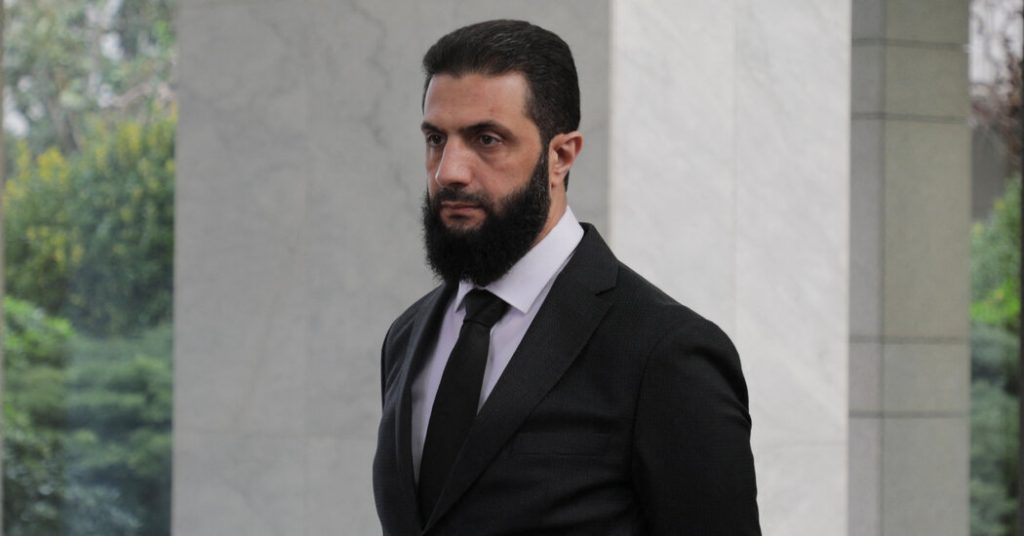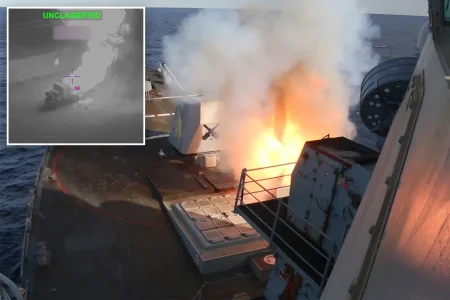Let’s break this story down in a way that feels more personal, like I’m walking you through the twists and turns of a political drama unfolding in real time. Imagine this as a conversation to help us piece together the threads of a fascinating and historic moment for Syria and the Middle East.
—
Picture this: Ahmed al-Shara, Syria’s newly appointed interim president, just arrived in Saudi Arabia. This is his first big trip abroad since he and his rebel coalition ousted Bashar al-Assad, the dictator who had clung to power for years. It’s a monumental shift in Syria’s political landscape—one that’s got the world watching with bated breath.
So, why Saudi Arabia? Why make this oil-rich kingdom his first stop? There’s a lot of symbolism behind this choice. Syria, under al-Assad, leaned heavily on Iran as an ally. Now, by choosing Saudi Arabia for his debut on the global stage, al-Shara seems to be signaling a pivot—a movement away from Iran and toward the Gulf countries. This isn’t just about courtesy, either. It’s about realigning Syria’s position in the messy chessboard of Middle Eastern politics.
When al-Shara touched down in Riyadh, Saudi Arabia’s bustling capital, expectations were high. He’s set for crucial talks with Crown Prince Mohammed bin Salman, a figure who wields enormous regional influence. The big-ticket items on their agenda? Strengthening ties between their countries and figuring out how to lift the heavy burden of international sanctions on Syria. Sanctions, legacy issues from the al-Assad era, have crippled Syria’s economy, and addressing them is key if the interim government truly wants to help the country rise from the rubble of war.
But let’s take a step back. This trip to Riyadh isn’t happening in a vacuum. The weeks leading up to it were marked by a whirlwind of diplomatic activity in Damascus, Syria’s capital. Picture the scene: diplomats streaming in from Europe, the United States, Gulf nations, and even Russia—all eager to meet with al-Shara and his newly formed government. Everyone’s jostling for a piece of the action, trying to establish their footing in this post-Assad Syria. And why wouldn’t they be? This is a pivotal moment not just for Syria, but for the whole Middle East—a region that’s constantly being reshaped by wars, alliances, and power struggles.
Let’s zoom out. The overthrow of Bashar al-Assad has sent shockwaves through the region. Iran, once a dominant player, supporting Assad with money and weapons, finds its influence dwindling. Why? Because its proxies in the region, often targeted in recent conflicts with Israel, have suffered serious setbacks. Meanwhile, Russia, which also propped up Assad, is grappling with its own problems now that its major Middle Eastern ally is no longer in power. Contrast that with Turkey, which has backed Syrian rebels for years. It’s now emerging as a key player in shaping the country’s future. And then there’s Saudi Arabia and its Gulf allies, who are stepping up to assert their influence with Syria’s new leadership.
In the early days of this transitional government, Gulf states treaded carefully. They weren’t exactly sure what to make of the Islamist factions that now hold significant sway in al-Shara’s coalition. But things have changed. Their tone has shifted, and now they’re offering more engagement and support—albeit with caveats. One clear ask from Gulf leaders? Al-Shara and his team need to show they’ll govern inclusively, representing Syria’s diverse sectarian landscape. They don’t want another authoritarian regime or a narrowly focused power base to take root.
Just last week, there was a striking moment that highlighted how much these Gulf countries care about shaping Syria’s future: Qatar’s emir paid a visit to Damascus. This was a big deal because it’s the first time a Gulf leader has set foot in Syria since al-Shara and his coalition took over in December. The message was clear—Gulf rulers want a say in what happens next under al-Shara’s interim government. And Saudi Arabia, as the region’s powerhouse, appears especially keen to reassert itself not just in Syria, but also in Lebanon, a neighboring country where Iranian sway had risen dramatically over the past decade.
Saudi Arabia has been playing its cards pretty strategically. In the days following al-Shara’s rise to power, Saudi leaders—from King Salman to Crown Prince Mohammed bin Salman—sent congratulatory messages, expressing their hopes that he’d succeed in leading Syria. That’s not just diplomacy; it’s a signal of intent. Saudi officials are now actively championing Syria’s cause on the world stage, calling for Western nations to reconsider the sanctions imposed during Assad’s brutal rule. Clearly, they’re positioning themselves as a key partner for Syria’s new leadership.
Al-Shara, for his part, hasn’t been shy about returning the favor. In December, in his first big interview with Arab media, he chose Saudi Arabia’s Al Arabiya network as his platform. That’s no coincidence. He could’ve gone with Qatar’s Al Jazeera, a media outlet he’s appeared on numerous times in the past. But this choice further underlines how important Saudi Arabia is going to be in his vision of Syria’s future. In that interview, al-Shara even reflected on his personal ties to Saudi Arabia, sharing memories of his childhood years spent there.
Now let’s rewind a bit. For decades, Syria was Iran’s closest ally among Arab nations. But the civil war that erupted in 2011 changed the dynamics dramatically. As Assad brutally cracked down on dissent, Saudi Arabia and the UAE cut ties, closing their embassies in Syria. They became two of Assad’s harshest critics, throwing their support behind the rebels fighting to oust him. But somewhere along the line—after years of war and its horrendous toll—things began to shift. Gulf countries saw a window of opportunity. By 2023, they were offering humanitarian aid to Assad’s government after an earthquake devastated parts of the region. And later that year, Syria was readmitted to the Arab League after a decade of being isolated.
Yet, all of that seems like ancient history now. Assad is gone, and Iran no longer holds the same sway over Syria. What happens next? Well, Saudi Arabia seems to see this moment as its chance to step in and fill the vacuum.
This story is far from over. Al-Shara’s trip to Riyadh is just another chapter in the unfolding saga of a Syria trying to rebuild itself, recalibrate its alliances, and navigate an uncertain future. What’s clear, though, is this: Syria’s political map is being redrawn, and the choices al-Shara makes now will not only determine the fate of his country but also reshape the power dynamics of the entire Middle East. As the region’s players—Saudi Arabia, Iran, Turkey, and others—jockey for influence, we’re watching history in the making.









